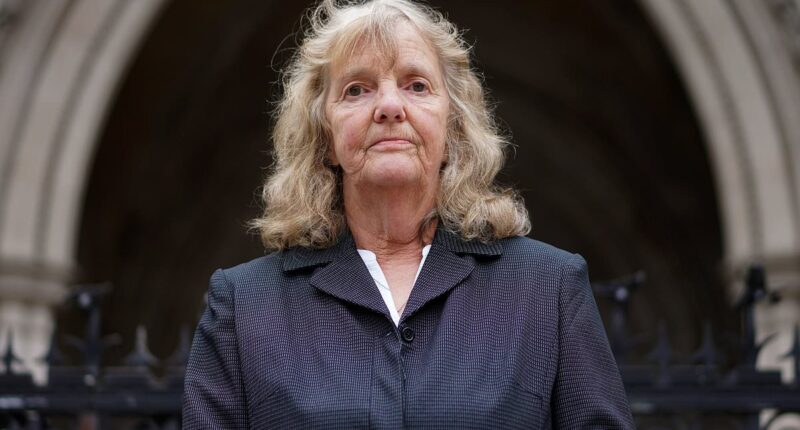The warning comes from the mother of a woman who was confined to her home and sadly took her own life after her benefits were taken away. According to Jodey Whiting’s mother, Joy Dove, the Labour party needs to be cautious as their proposed cuts to disability benefits could result in more tragic deaths like her daughter’s.
Jodey Whiting, a resident of Stockton-on-Tees at the age of 42, was scheduled for a work capability assessment in January 2017. However, due to her health condition, she was unable to attend, leading to the cessation of her benefits. Her mother revealed these details during the Teesside Coroner’s investigation.
Tragically, Jodey was discovered deceased in her residence a month after her benefits were halted, with family members making the heartbreaking find. The initial coroner’s report classified her death as a suicide, but it did not delve into the role played by the Department for Work and Pensions (DWP) in making the decision that potentially impacted her mental state.
Ms Dove was granted a second inquest into her daughter’s death, which ruled on Monday that Ms Whiting had taken her own life after her benefits were wrongly ended.
And now the grandmother is calling on Sir Keir Starmer to rethink his £5billion benefit slash which is reportedly set to cut disability payments for one million people.
Ms Dove told the Mirror: ‘If Labour carry on with their disability cuts there will be more Jodeys. What happened to Jodey is what happens when benefits are taken away.
‘They are saying they need to fill this black hole. But they can’t fill it with vulnerable people.
‘It’s the same with the winter fuel allowance and the benefits cap. People need protecting. There are so many people who have taken inspiration from Jodey’s story. We need to keep fighting for them.’

Jodey Whiting (pictured) killed herself in February 2017 after her benefits were cut. She left notes claiming she was unable to pay her bills and had no food

Her mother Joy Dove pictured in 2021. She has now warned Labour that their proposed disability cuts will lead to similar deaths
Ms Dove added that she feels as though she has proved her daughter correct following the coroner’s verdict, which she claimed was greeted by words of agreement by those in the gallery.
Notes found alongside the mother-of-nine’s prescriptions drugs were read out in court on Monday, with one saying: ‘I’ve had enough.’
Bridget Dolan KC, coroner’s counsel, said: ‘She wrote about not being able to pay her bills and having no food.
‘In some she wrote about feeling breathless and having back pain and trying to pay her bills and being in debt.’
Ms Dove fought a long legal battle for a second inquest, which went all the way to the Court of Appeal.
She told Teesside Magistrates’ Court how her daughter had nine children including two sets of twins and suffered from a curvature of the spine, later being diagnosed with a brain cyst.
An Independent Case Examiner (ICE) report into the decision to remove Ms Whiting’s benefits found that a number of mistakes had been made, and her payments should not have been withdrawn.
In a pen portrait, Ms Dove said: ‘Her death really impacted on me, and to learn from the ICE reports of the number of failures by the DWP was to play was a further deep shock that I have not recovered from.’

Sir Keir Starmer, pictured in March giving a speech about state reforms, insists benefits cuts are urgently needed as the welfare bill is ‘going through the roof’

From L-R, Ms Whiting’s daughter Leah Bell, mother Joy, daughter Emma Bell, niece Demi Wathen and daughter Chloey Bell, holding up a photo of her
She added that she reassured her daughter that she would help her, telling the inquest: ‘I said, “don’t you worry, we will write in and we will explain how you have been in hospital and you are still convalescing.”‘
But in January 2017 Ms Whiting was told she had missed the medical assessment while suffering from pneumonia.
And the following month, her mother said Ms Whiting received another letter saying she was fit to work.
Ms Dove claimed that her daughter told her she could not breathe or walk out of her flat at this time.
Ms Whiting then received another letter from the DWP telling her that her benefits were being stopped, including her housing benefit and council tax.
Ms Dove said when she saw her daughter, two days before her death, she was ‘shaking and crying’ and had threatened to kill herself.
She added that she was sure the stress of losing her benefits was the trigger for her decision to take her own life.
‘I know my daughter and I know it was (that),’ she told the inquest. ‘It was the fact she couldn’t find a job, the worry of paying bills and being pushed out after being so vulnerable all those years and years.’

Ms Dove pictured with Ms Whiting’s father Eric, who compared her to the ‘Pied Piper’ as she always had children around her who adored her

Ms Whiting’s mother, pictured in 2023, fought a long legal battle for a second inquest, which went all the way to the Court of Appeal
Questioned by Jesse Nicholls, for the family, Ms Dove added: ‘I know for a fact it was the DWP that caused it.
‘She was quite happy for me to go through and look after her. There’s no way it was anything other than that.’
Her father Eric Whiting, meanwhile, compared her to the ‘Pied Piper’ as she always had children around her who adored her.
He added: ‘She always saw the fun side of life until her health issues started.’
Ms Whiting, who had six grandchildren, had suffered from chronic pain, was dependent on opiates and had long-standing mental issues.
Her mother agreed that she had become increasingly housebound in the last years of her life.
She had a hospital stay in December 2016 after contracting pneumonia and that meant she missed letters about her benefits, saying she needed to be medically assessed.
Granting Ms Dove a second inquest in 2023, Lady Justice Whipple said: ‘I think it is in the interests of justice that Mrs Dove and her family should have the opportunity to invite a coroner, at a fresh inquest, to make a finding of fact that the (DWP’s) actions contributed to Jodey’s deteriorating mental health and, if that finding is made, to invite the coroner to include reference to that finding in the conclusion on how Jodey came by her death.

Ms Dove pictured with Ms Whiting’s daughter Emma Bell. Ms Dove agreed that Ms Whiting had become increasingly housebound in the last years of her life
‘After all, the department deals with very many people who are vulnerable and dependent on benefits to survive, and the consequences of terminating benefit payments to such people should be examined in public, where it can be followed and reported on by others who might be interested in it.’
The original inquest, which lasted just 37 minutes, determined Ms Whiting had taken her own life.
Ms Dove’s lawyers argued there were ‘multiple, significant failings’ by the DWP when it terminated her daughter’s Employment and Support Allowance (ESA) that were not considered at the previous inquest.
Her barrister Jesse Nicholls said: ‘The first inquest into Ms Whiting’s death provided her family with no catharsis. Indeed, the inquest has had the opposite effect given what is now known about how Ms Whiting came by her death.’
Lady Justice Whipple added in her ruling: ‘Thirdly, if the findings the family seeks are made, it is at least possible that the coroner will wish to submit a PFD (prevention of future deaths) report to the department.
‘Indeed, it may be that the coroner will wish to hear from the department at the second inquest about any remedial steps which have already been taken in light of the ICE Report and as part of the coroner’s consideration of whether to make a PFD report.’
A Government spokesperson said: ‘Our sincere condolences remain with Ms Whiting’s family.
‘DWP is ready to assist the new coroner with their investigation. We cannot comment on active legal proceedings.’

One million people are set to lose their disability payments amid Labour’s cost-cutting crackdown on benefits – causing uproar within the party (Stock photo)
Two photographs of Ms Whiting were placed on the coroner’s bench at the start of the hearing.
In May, it was revealed that one million people are set to lose their disability payments amid Labour’s cost-cutting crackdown on benefits – causing uproar within the party.
The huge changes to the welfare system, due to be announced next week, are tipped to see only the most severely disabled people qualify for support amid an overhaul of eligibility criteria.
Cuts to the Personal Independence Payment (PIP), for those with a long-term condition which causes them to struggle with mobility or every tasks, will account for the bulk of the £5billion savings.
The upheaval will also see payments slashed for many people with mental health conditions, those needing a hearing aid and people who struggle with basic daily processes like eating, washing and dressing themselves.
The changes are expected to affect around one million people – and will be applied both to people claiming disability payments for the first time and existing recipients, as reported by the Times.
Sir Keir Starmer insists benefits cuts are urgently needed as the welfare bill is ‘going through the roof’, while Chancellor Rachel Reeves added the government must ‘get a grip’ on the system. Ministers say savings will be used to bolster employment support and the basic rate of universal credit.
But Labour MPs have reportedly criticised the move – including deputy prime minister Angela Rayner and energy secretary Ed Miliband, who raised concerns in cabinet.

Chancellor Rachel Reeves said that the government must ‘get a grip’ on the system
Even work and pensions secretary Liz Kendall is said to be ‘unhappy with the scale of proposed cuts’, the New Statesman reported.
An announcement on the measures had been expected earlier in May – but was delayed amid a major operation to win over backbench sceptics.
Many have spoken out against cuts to PIPs in particular, which disability charity bosses have called ‘deeply damaging’, ‘devastating’ and ‘a disastrous move’.
The reforms also include getting rid of the ‘work capability assessment’ for benefits based on incapacity for work and preparing people with long-term sickness for work.
Ms Kendall is also expected to cut the top rate of benefits for those deemed unfit to work, which currently stands at more than £800 per month – twice the jobseekers’ rate.
But sweeping changes to the eligibility criteria for PIPs, paid out regardless of whether the person is working, will account for the bulk of the changes.
Around 3.2million people claim PIPs – up by more than a million since 2019. Roughly five million people are expected to be claiming them by the end of the decade.
The government has suggested making those changes in particular is not desirable but nevertheless necessary – the cost of PIPs is forecast to increase by £15billion in real terms by 2030.

But Labour MPs have criticised the move – including deputy prime minister Angela Rayner, pictured in February, who raised concerns in cabinet

Even work and pensions secretary Liz Kendall, pictured in February, is said to be ‘unhappy with the scale of proposed cuts’
PIPs – the major controversy of the package – are currently awarded on a points system, with applicants getting scored based on how difficult they find certain everyday and mobility-related activities.
The number of points they get determines the grant they receive. Amounts range between £1,500 and £9,600 a year.
But from now on, applicants will need to score at least four points on at least one activity to qualify for being considered for a payment. The need for a hearing aid does not meet the threshold.
Those who need help to wash their hair or body below the waist would not qualify for support – but those who need help to wash their upper body would. Needing help going to the toilet would meet the threshold – but those who need reminding to use it would not.
Those who need help cooking a meal would qualify for support – but those who could use a microwave would not. Needing to be reminded to see people face-to-face would not be supported – but needing help to actually have those interactions would.
Applicants who get the four points needed to qualify for being considered would then need to get another four points on top of that to get the lower rate – and another eight to get the higher one.
For confidential support, call Samaritans on 116123 or visit www.samaritans.org

















